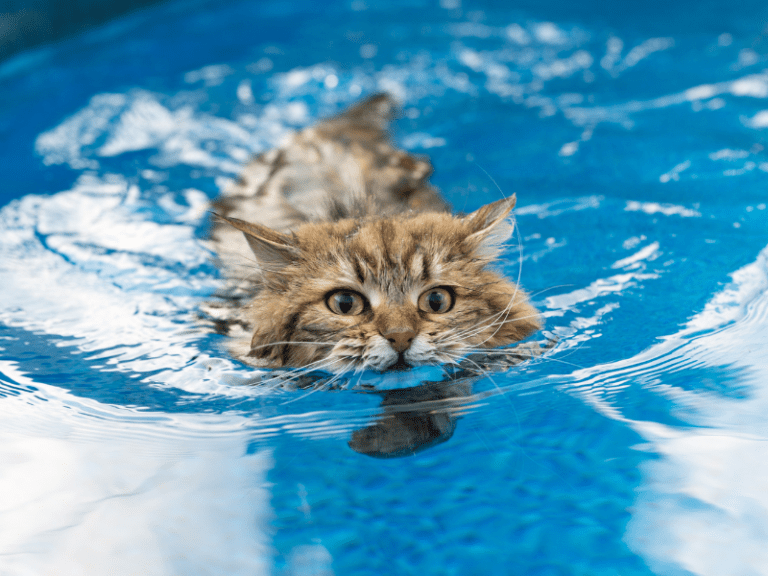Cat Allergies: Here’s How You Can Still Enjoy Feline Companionship
FULL DISCLOSURE: The links I share in this course ARE my affiliate links. This means I earn a commission, at no extra cost to you. In fact, sometimes you’ll get a discount or free credits just FOR using my link. 🙂
Do you suffer from a severe cat allergies but still yearn for the purring and cuddles of a furry friend?
It may seem like you're out of luck, but that's not necessarily the case. While it's true that some people simply can't keep cats in their homes due to their allergies, there are measures you can take and alternatives to cat ownership that will allow you to still enjoy the companionship of cats.
In this article, we'll take a closer look at allergies to cats, the solutions available for those with cat allergies, and some fun cat-friendly activities to keep you occupied.
Introduction – Allergies to cats
Achoo! Are you constantly sneezing, sniffling, and scratching your itchy eyes whenever you're near a feline friend? Well, you're not alone! Cat allergies are a common complaint among animal lovers, and they can really put a damper on your snuggle time with your furry buddies.
If you suffer from a cat allergy, you're not alone. According to the American College of Allergy, Asthma, and Immunology, 10 to 20 percent of people are allergic to cats.
Cat allergies are caused by a protein called Fel d 1, which is found in cat saliva, skin, and urine. This protein becomes airborne when the cat licks its fur, and those with an allergy to cats will experience symptoms when exposed to it.
Symptoms of an allergy to cats

From sneezing fits to itchy eyes, here are the telltale signs that your body isn't feeling the feline love:
- Sneezing: If you're constantly reaching for a tissue every time you're near a cat, it's a pretty good indication that you're allergic.
- Watery eyes: Are your eyes starting to resemble Niagara Falls? It's a classic sign of an allergic reaction to cats.
- Runny or stuffy nose: A never-ending stream of snot can make you feel like you're in a perpetual cold season, and that's not fun!
- Itchy skin or rashes: Is your skin feeling itchy or developing red patches after spending time with a cat? That's a definite sign of an allergic reaction.
- Difficulty breathing: In severe cases, some people may experience shortness of breath, wheezing, or coughing after coming into contact with cat allergens.
Causes of cat allergies
So, what's causing all the fuss? Well, let's get to the nitty-gritty. The main culprits of cat allergies are proteins found in cat saliva, urine, and dander. When a cat grooms itself, these proteins can become airborne and trigger an immune response in sensitive individuals. In some cases, simply touching a cat or being in a room where a cat has been can cause allergic symptoms.
But don't let your allergies drive a wedge between you and your feline friends! There are plenty of ways to manage your symptoms and still enjoy the company of your furry buddies. From taking antihistamines to keeping your home clean and allergen-free, there are plenty of ways to keep the cat hair from flying and keep your allergies at bay.
How to minimize cat allergy symptoms
Don't let those pesky symptoms ruin your feline fun! Here are some purr-fect tips to keep those allergies at bay and still enjoy your time with your favorite feline friends.
Allergy Medicine
First and foremost, taking allergy medication can be a real lifesaver! Whether it's antihistamines or nasal sprays, these over-the-counter remedies can help alleviate symptoms like sneezing, itching, and runny nose faster than you can say “kitten caboodle.”
Hand Washing
Next up, make sure to give those hands a good scrubbin' after spending time with a cat. Washing your hands and changing your clothes can help get rid of any pesky allergens that may be clinging to your skin or clothes, and trust us, your nose will thank you for it.
Keeping Your Home Clean
Of course, keeping your home clean is also a crucial step in minimizing those allergy symptoms. Regularly cleaning your living space, especially those areas where cats like to hang out, such as couches, beds, and carpets, can make a big difference. And using a HEPA filter vacuum to trap allergens in the air is the cat's whiskers!
Clean The Cat Litter Box Regularly
Make sure to clean inside and around the cat litter boxes regularly to prevent the buildup of allergens and keep the air in your home fresh and clean. Consider using low-dust, unscented litter to minimize dust particles, and wear a mask and gloves when cleaning the litter box to further reduce your exposure to allergens.
Invest in An Air Purifier
Investing in an air purifier is another great option to help filter out cat allergens from the air. You might even find that the air purifier becomes your new furry best friend!
Visit Virtual Cat Cafes
Finally, if your symptoms are severe, it might be best to limit your exposure to cats or avoid them altogether. But don't worry, there are still plenty of ways to show your love for our feline friends, from virtual visits to cat cafes, to volunteering at shelters.
Solutions for those with cat allergies
Don't fret, there are several solutions for those who want to enjoy the company of cats without suffering from pesky symptoms. Here are some of the best tips to help you cope with cat allergies:
- Consider getting a hypoallergenic cat breed. While there is no such thing as a completely hypoallergenic cat, some breeds, such as the Siberian, Devon Rex, and Sphynx, are known to produce fewer allergens than others. Adopting a hypoallergenic cat may help reduce your exposure to allergens and minimize your symptoms.
- Set up a cat-free zone in your home. Designating a room or area where your cat is not allowed to enter can provide you with a safe space to retreat to when your symptoms start to act up. Just make sure to keep this area clean and free from cat hair and dander.
- Use allergen-reducing products. There are several products on the market that are designed to reduce cat allergens in your home, such as air purifiers, vacuum cleaners with HEPA filters, and special cat shampoos that can help reduce the amount of dander your cat produces.
- Consult with an allergist. If your symptoms are severe, it may be worth consulting with an allergist to determine the best course of action. They may be able to recommend prescription medications or immunotherapy, which involves gradually exposing you to cat allergens over time to desensitize your immune system.
- Practice good hygiene. In addition to washing your hands and changing your clothes after being around cats, it's also a good idea to bathe your cat regularly to reduce the amount of dander and allergens they produce.
Petting Therapy Can Help Alleviate Symptoms of Cat Allergies
Believe it or not, petting a cat can actually help alleviate symptoms of cat allergies! While it may seem counterintuitive, brief bouts of petting therapy can provide a sense of calm and relaxation, which can help alleviate the physical and emotional stress caused by cat allergies.
Petting therapy benefits those with anxiety or depression
Petting therapy can be particularly beneficial for those who suffer from anxiety or depression. The rhythmic motion of petting a cat can have a meditative effect, helping to slow your heart rate and promote feelings of relaxation. Additionally, the act of stroking a cat can release endorphins in the brain, which can help alleviate symptoms of anxiety and depression.
Precautions for petting therapy with a cat allergy
If you have a cat allergy, it's essential to take precautions before indulging in petting therapy. Make sure to wash your hands before and after petting a cat to reduce your exposure to allergens. Consider wearing gloves or using a barrier, such as a towel or blanket, to prevent direct contact with the cat's fur.
The amount of time spent petting a cat depends on allergy severity
Of course, the amount of time you can spend petting a cat will depend on the severity of your allergy symptoms. While some people may only be able to tolerate brief petting sessions, others may be able to spend more extended periods of time with cats without experiencing any symptoms.
Alternatives to cat ownership

If you have severe allergies to cats, it can be challenging to spend time with them without experiencing unpleasant symptoms. However, there are still plenty of ways to enjoy the company of cats in a safe and comfortable manner. Here are some ideas to consider:
- Outdoor cat-watching: Find a nearby park or outdoor space where cats tend to congregate, and spend some time observing them from a safe distance. You can bring a book or just relax and enjoy the company of the cats from afar.
- Virtual cat-watching: With the proliferation of cat videos online, you can easily spend hours watching adorable cats from the comfort of your own home. From YouTube to social media, there's no shortage of feline-friendly content online.
- Cat cafes: Many cities now have cat cafes where patrons can enjoy a cup of coffee or tea while spending time with resident cats. Just be sure to call ahead and ask about their policies regarding allergies.
- Volunteer at a shelter: Many animal shelters are in need of volunteers to help care for their cats. You can spend time playing with the cats or helping with tasks like feeding and cleaning. Just be sure to talk to the shelter in advance about your allergies and take precautions to reduce your exposure to allergens.
- Attend cat shows: Cat shows are a great way to see a variety of breeds and interact with cats in a safe and controlled environment. Just be sure to talk to the event organizers in advance and ask about their policies regarding allergies.
Conclusion
If you suffer from an allergy to cats, it doesn't mean you have to give up on the companionship of a furry friend.
There are measures you can take to minimize your allergy symptoms and alternatives to cat ownership that will allow you to still enjoy the companionship of cats. From low-allergen cats to petting therapy and cat-friendly activities, there are plenty of options available for those with cat allergies.
So don't give up on your feline friends just yet – there's still hope!







